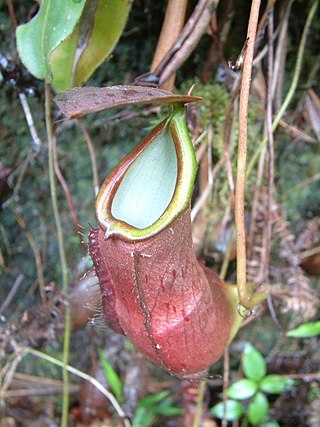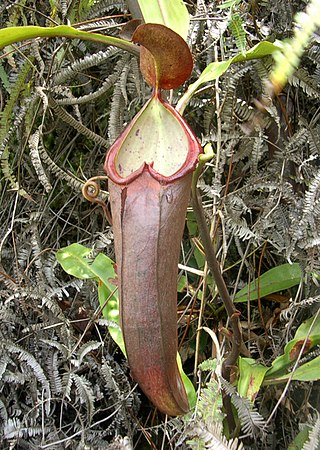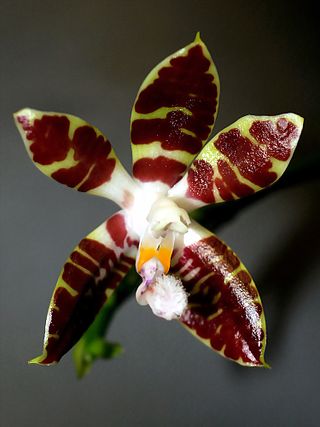
The Sumatran water shrew is a red-toothed shrew found only in the Padang highlands of western Sumatra, Indonesia. Its natural habitats are streams in montane forests. The species is only known from a holotype, which is damaged, and was previously listed as critically endangered by IUCN. It is believed to be severely threatened by habitat loss.

Nepenthes sumatrana is a tropical pitcher plant endemic to the Indonesian island of Sumatra, after which it is named.

Nepenthes longifolia is a tropical pitcher plant endemic to Sumatra, where it grows at elevations of between 300 and 1100 m above sea level. The specific epithet longifolia, formed from the Latin words longus (long) and folius (leaf), refers to the exceptionally large leaves of this species.

Nepenthes beccariana is a tropical pitcher plant. The species was described in 1908 by John Muirhead Macfarlane based on a specimen collected from the island of Nias, which lies off the western coast of Sumatra. It appears to be closely related to both N. longifolia and N. sumatrana, and the former is possibly a heterotypic synonym of this taxon.

The hairy-nosed otter is a semiaquatic mammal native to Southeast Asia and one of the rarest and least known otter species. It is threatened by loss of natural resources and poaching.

The great-billed heron is a wading bird of the heron family, resident from southeast Asia to Papua New Guinea and Australia.

Taxus sumatrana, or the Sumatran yew, is a large evergreen shrub and one of the eight species of yew. Its taxonomic namesake is indicative of the species being found in Indonesia ; however, T. sumatrana is also found in a number of South and Southeast Asian countries, including parts of Afghanistan, Bangladesh, Bhutan, China, India, Indochina, Nepal, Pakistan, the Philippines, Taiwan, and Tibet. Given this broad geographical range, it is also known as the Taiwan yew, the Chinese yew, as well as the East Himalayan yew. Plants of the World Online recognizes T. sumatrana as a synonym of Taxus wallichiana.
The Sumatran partridge, or Sumatran hill partridge, is a bird species in the family Phasianidae. It is found in highland forest in central Sumatra, Indonesia. It is sometimes treated as a subspecies of the grey-breasted partridge.

The Asiatic water shrews are the members of the genus Chimarrogale. They are mammals in the subfamily Soricinae of the family Soricidae. They are aquatic, with some species inhabiting streams. The genus contains the following species:

The black-naped tern is an oceanic tern mostly found in tropical and subtropical areas of the Pacific and Indian Oceans. It is rarely found inland.

Phalaenopsis sumatrana is a species of orchid native to peninsular Thailand, Vietnam and southern Sumatra.

The Equatorial spitting cobra also called the Malayan spitting cobra, golden spitting cobra, Sumatran spitting cobra, or Palawan spitting cobra, is a species of spitting cobra found in Southeast Asia.
Rauvolfia sumatrana is a tree in the family Apocynaceae.
Diospyros sumatrana is a tree in the family Ebenaceae. The specific epithet refers to Sumatra.

Mesosini is a tribe of longhorn beetles of the subfamily Lamiinae.
Zelota is a genus of longhorn beetles of the subfamily Lamiinae, containing the following species:
Zelota bryanti is a species of beetle in the family Cerambycidae. It was described by Stephan von Breuning in 1938. It is known from Borneo.
Zelota malaccensis is a species of beetle in the family Cerambycidae. It was described by Stephan von Breuning in 1936. It is known from Malaysia.
Zelota spathomelina is a species of beetle in the family Cerambycidae. It was described by Charles Joseph Gahan in 1902. It is known from Borneo.
The black Sumatran langur is a species of monkey in the family Cercopithecidae. It was formerly considered a subspecies of the Sumatran surili, Presbytis melalophos but genetic analysis revealed that these are separate species. The black Sumatran langur is native to the island of Sumatra in Indonesia. It is listed as endangered by the IUCN due primarily to deforestation, and also due to animals taken for pets.











